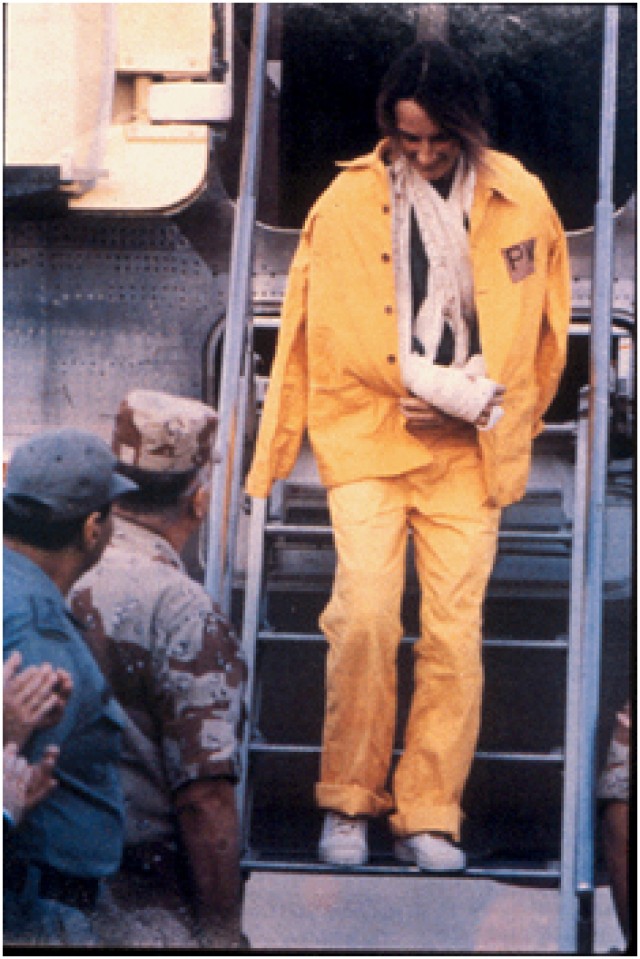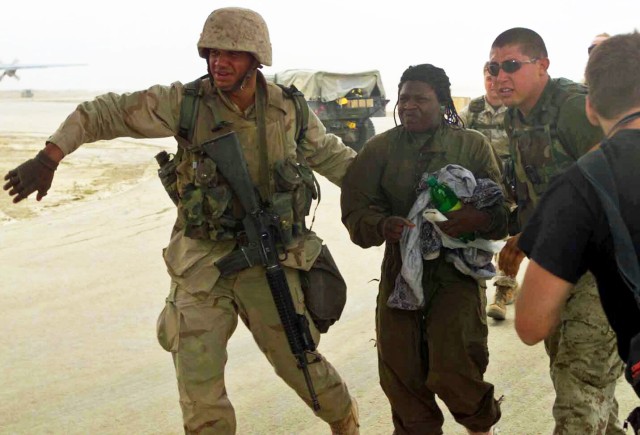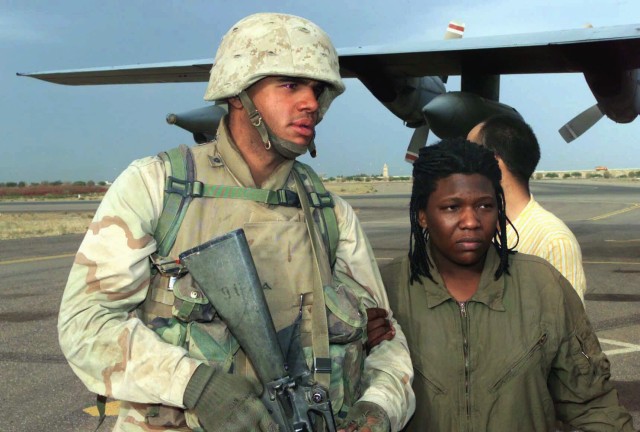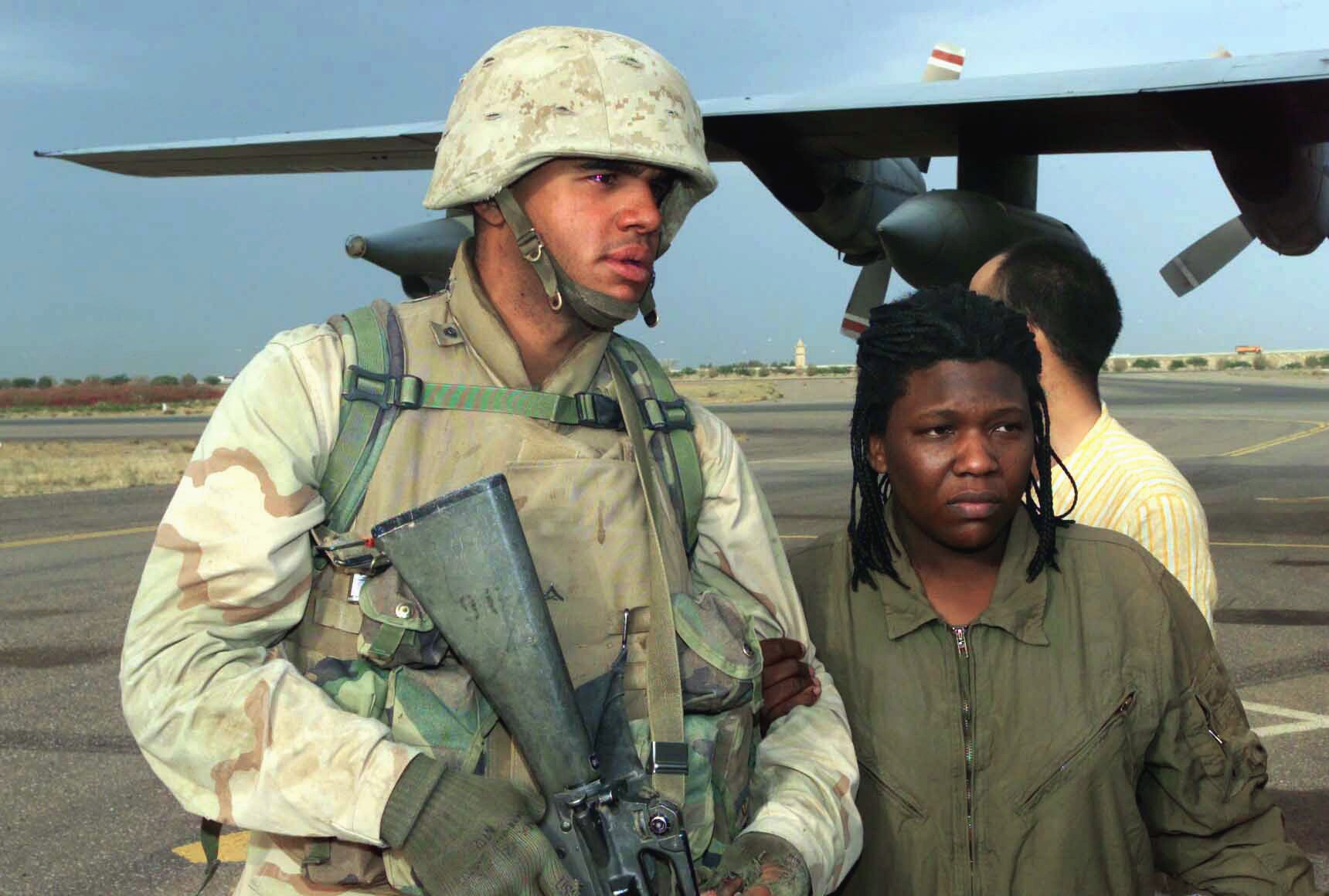WASHINGTON (Army News Service, March 30, 2011) -- Maj. Rhonda Cornum could see her breath when she awoke on the fourth day of ground fighting during Operation Desert Storm.
It was February 1991, and the flight surgeon combated the chilly Iraqi morning by slipping on her jacket and nursing a few cups of hot coffee.
She was headed out on a routine flight to shuttle passengers, when her UH-60 Black Hawk crew received a call telling them their mission had changed and was now a rescue. That call changed Cornum's life forever.
A fighter pilot, Air Force Capt. Bill Andrews, had been shot down behind enemy lines and suffered a broken leg. Cornum's crew was the closest aircraft around.
"Unfortunately we flew right over a big bunker full of weapons and they shot the tail off my helicopter ... and they shot me," said Cornum, now a brigadier general.
Cornum was one of three Soldiers to survive the 140-mile-per-hour crash. She suffered two broken arms, a bullet wound to her shoulder, and a torn knee, only to be dragged from the wreckage and taken into Iraqi captivity.
She was held in a primitive underground jail cell for eight days in what she calls "austere" conditions. She was also sexually molested by an Iraqi Soldier while being transported to the prison, but said being fondled was low on her list of things going wrong that day.
"The molestation didn't do a thing to me," she assured. "It is just as irrelevant now as it was then."
Cornum said she was more surprised than emotionally damaged from the assault -- she was dirty, bloodied and badly wounded.
"If it doesn't increase the likeliness you were going to stay there longer, and it wasn't excruciating, and it wasn't life-threatening, then it really didn't matter," Cornum explained.
On March 6, 1991, Cornum was released along with 23 other prisoners of war in end-of-war negotiations.
Cornum's story is as relevant today as it was 20 years ago. Few women have served as POWs.
From Florena Budwin, a Civil War woman who disguised herself as a man to join union troops and was held in a confederate prison camp, to the 67 Army nurses who were taken captive by the Japanese in World War II, there have been less than 100 military women held as POWs throughout American history.
As the debate of women serving in combat roles continues, Cornum said she believes the biggest contribution of her career is simply the proof that military women can persevere in tough situations.
While Cornum always felt that she was a strong person, she said her experience as a POW only confirmed her belief that she was resilient.
"It helps put everything else in perspective," Cornum said of being taken captive. "It made you recognize your strength, when previously it hadn't really been tested much."
Cornum completed five more years of medical training upon her release, and while studying to take the board, many of her colleagues said it was the most stressful and worst experience of their life -- Cornum disagreed.
"The same reason that I came through the POW experience well is the same reason I came through graduate school well, and the same reason I flipped my car and came out of that well -- it's that I approach every problem very similarly, that no matter how bad it gets, it will always get better."
The brigadier general is now the director of Comprehensive Soldier Fitness, the Army's authority on resiliency training, and in the past 20 years has authored a book, become a urologist and earned a doctorate's degree in philosophy.
Cornum said she didn't come up with how to instill resilience, but she did strongly advocate teaching it before something traumatic happens, rather than after.
She likens teaching resiliency to training for a marathon: not everyone who trains finishes the race, but those who do train have a much better chance at succeeding.
"So you ought to train first," she said.
"I'm evidence that it works," Cornum pointed out.
Cornum's approach is similar to how former Army Spc. Shoshana Johnson has lived her life since she was taken into Iraqi captivity in 2003. Johnson, who joined the Army with the goal of one day attending culinary school, was shot in both legs before being taken by Iraqi militants after her convoy was ambushed.
Johnson and six other American Soldiers were moved seven times during their 22 days of captivity in Iraq.
"You don't know what's going to happen from day-to-day," Johnson said of her time as a POW. "I wanted to see my daughter grow up and live her life."
Johnson's daughter was 2 years old at the time, and Johnson said her family was shocked that she had been taken prisoner. Even though her dad spent 20 years in the Army and understood the military's demands, when she joined in 1998, being captured wasn't really a consideration.
Johnson said her strong belief in God and thoughts of her family got her through the 22-day ordeal, yet she admits she was terrified.
"It's a constant fear, because you're in the middle of a combat zone and this country has a history of executing people," she explained.
Now, Johnson said, she is more grateful for the little things in life and sees herself as very blessed. She will finish her culinary arts degree in May, and is set on becoming a pastry chef.
Johnson said she is proud of her time in the Army and doesn't regret her decision to join. However, she said military women have long served in roles they aren't recognized for, and they should receive the proper training for what they might possibly encounter in combat -- just as male Soldiers do.
Her advice on staying tough while in captivity: "Follow your instincts. You've got to listen to your gut."
Cornum agreed.
"You've got to make the decision that what you're doing is worth the risk before you do it," she said. "Recognize that you have a new job, and that is staying alive with honor."
Not long after Cornum's rescue in 1991, the restriction of women flying aircraft in combat was repealed, and in 1993 Congress rescinded female combat exemption laws, opening up a quarter million jobs previously closed to women.
Earlier this month, the Military Leadership Diversity Commission recommended to the president that DoD eliminate all combat-exclusion policies for women.
Related Links:
Military Leadership Diversity Commission Report
Female MPs bring professionalism, added capabilities to fight
Commission recommends women be allowed in combat arms








Social Sharing